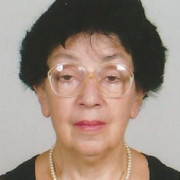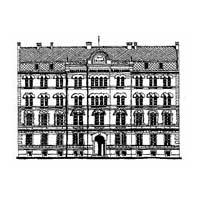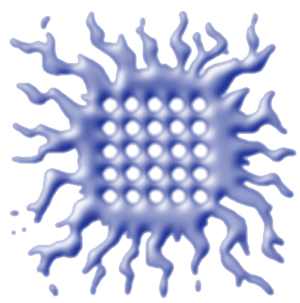It is our honor and privilege to announce the winners of the SFKM2015 Charter of Gratitude for pioneering contributions to the growth of condensed matter physics in Serbia. The goal of the Charter is to mark outstanding physicists who seminally contributed to the creation and historic development of this field of science in Serbia, through their research, supervising of graduate and undergraduate students research and theses, and mentoring younger colleagues.
Nominated for the SFKM2015 Charter of Gratitude were:
Prof. Dr. Ljiljana Dobrosavljević-Grujić
Prof. Dr. Sava Milošević
and, posthumously,
Prof. Dr. Bratislav Tošić
Very rich nomination material was reviewed by special SFKM committee: Dr. Zoran Ivić, Dr. Nenad Švrakić, Dr. Milan Knežević, and Dr. Leonardo Golubović (committee chair).
The committee concluded that All Three Candidates deserved the SFKM Charter of Gratitude by being head and shoulder above other condensed matter physicists in Serbia of their time, in terms of their scientific contributions, mentoring of graduate and undergraduate students, and unique influence on the development of this field of physical science in Serbia. In particular, high scientific level and very character of SFKM conferences is in large part direct reflection of the creative scientific spirit initiated by these pioneers of our condensed matter physics.
We as the conference organizers congratulate the winners and their families for this award, and thank numerous colleagues who supported the nominations.
 Achievements of Professor Dobrosavljević-Grujić are closely related to the very beginning of the theoretical research in Condensed Matter Physics in Belgrade and in Serbia overall. Soon after she had returned from the specialization in France, where in 1971 she had completed her doctoral thesis on the Theory of Inhomogeneous Superconductors under the supervision of Prof P. G. de Gennes (before he won Nobel Prize), professor Dobrosavljević-Grujić initiated multiple lines of research in Low Temperature Physics, Superfluidity, Superconductivity and Low-dimensional Systems at the Institute of Physics in Belgrade. It should be stressed that this was the period of activity of all this year laureates who took the challenge to explore many new areas of modern condensed mater physics despite the fact that in Serbia there had been no scientific work in these fields before.
Achievements of Professor Dobrosavljević-Grujić are closely related to the very beginning of the theoretical research in Condensed Matter Physics in Belgrade and in Serbia overall. Soon after she had returned from the specialization in France, where in 1971 she had completed her doctoral thesis on the Theory of Inhomogeneous Superconductors under the supervision of Prof P. G. de Gennes (before he won Nobel Prize), professor Dobrosavljević-Grujić initiated multiple lines of research in Low Temperature Physics, Superfluidity, Superconductivity and Low-dimensional Systems at the Institute of Physics in Belgrade. It should be stressed that this was the period of activity of all this year laureates who took the challenge to explore many new areas of modern condensed mater physics despite the fact that in Serbia there had been no scientific work in these fields before.
The impact of personality and research of professor Ljiljana Dobrosavljević-Grujić on Serbian condensed matter physics is enormous. She supervised a number of doctoral theses, of Azra Hujdur, Miodrag Kulić, Zoran Radović and many others, establishing in this way our school of modern theoretical condensed matter physics. Impressive research work of professor Dobrosavljević-Grujić, published in leading international physics journals, was also marked by an intensive international cooperation directed by her. It included many seminars and study visits of Serbian physicists to leading world laboratories, and hosting many well-known physicists in Belgrade. She also provided significant contributions as a leading researcher on a number of collaborative international research projects, like those with USA, Russian Federation, or the long lasting cooperation with the Laboratoire de Physique des Solides, Universite Paris Sud, Centre d’Orsay in France. Professor Dobrosavljevic Grujić built a respectable group researches with highly meritorious results in superconductivity, dealing with modulated materials, resonant pinning, magnetic Josephson’s junctions, magnetic superconductors, … . Research and scholarship efforts of professor Dobrosavljević-Grujić produced a significant number of researchers whose names and scientific results are well known in the world of physics. Two of her former students (M. Kulić and Z. Radović), as well as professor Dobrosavljević-Grujić herself were winners of the most prestigious Serbian award for physics “Marko Jarić”, popularly known as “Serbian Nobel”.
Activities of professor Dobrosavljević-Grujić continued after she retired in 2000; she participated in the research projects of the Ministry of Science and Technology until 2010, and even now her engagement continues within postdoctoral studies and the research on the non-equilibrium quasiparticle transport in superconductors with Zorica Popović who talked at SFKM 2015.
Serbian scientific community is thankful to professor Ljiljana Dobrosavljević-Grujić in many different ways. She has been spiritus movens behind numerous fields of research in condensed matter physics that are still flourishing in Serbia. This award is only a way to thank and congratulate to Ljiljana for all accomplishments during the first 80 years of her productive life. By lucky chance, this conference coincides with celebrating Ljiljana’s 80th birthday. As the organizers of this conference we wish Ljiljana a happy birthday and many productive years to come.
 Dedicated work of Professor Sava Milošević from the early seventies till now has significantly contributed to the development of contemporary Statistical Physics and Condensed Matter Physics in Serbia. Combining the excellent tradition of Theoretical disciplines at the Faculty of Physics of Belgrade with the experience he gained during doctoral studies at MIT, professor Milošević brought a fresh breath of world trends in this area of science in early 1970s, thus opening the modern era of Statistical Physics in Belgrade, among the leading centers in Europe.
Dedicated work of Professor Sava Milošević from the early seventies till now has significantly contributed to the development of contemporary Statistical Physics and Condensed Matter Physics in Serbia. Combining the excellent tradition of Theoretical disciplines at the Faculty of Physics of Belgrade with the experience he gained during doctoral studies at MIT, professor Milošević brought a fresh breath of world trends in this area of science in early 1970s, thus opening the modern era of Statistical Physics in Belgrade, among the leading centers in Europe.
By his continuous work with students and younger associates in Serbia as well as by maintaining connections with the centers around the world, professor Sava Milošević has successfully developed different areas of modern Statistical Physics. From the pioneering work on scaling theory of critical phenomena (with H. E. Stanley), his research areas span a broad range of topics, ranging from the exact result on spin models with imperfect interactions and applications of the renormalization group in the theory of phase transitions, through physics of polymers and fractal structures, to the latest problems of geometric characterization of phase transitions and some fundamental questions in the theory of complex systems. Also, professor Sava Milošević has successfully initiated the formation of research centers for the application of Statistical Physics methods for solving some practical problems in neurology and the characterization of the magnetic domain structure of disordered systems.
Professor Milošević’s work resulted in the formation of the widely recognized research groups, including researchers such as Milan Damnjanović, Milan Knežević, Sunčica Elezović-Hadžić, Vladimir Miljković, Djordje Spasojević, Zoran Borjan, Ilija Savić and others, at the Faculty of Physics in Belgrade; Dragica Knežević and Ivan Živić, at the Faculty of Science in Kragujevac, and Djordje Stratimirović, Vladimir Matić and Suzana Blesić, at other research centers in Belgrade.
Besides the above mentioned colleagues who have developed successful research careers in Serbia, there is a long list of names of all 55 undergraduates, 14 MS students and 12 PhD students guided by Professor Sava Milošević in their research work, such as our deceased colleagues Mijat Mijatović and Marko Jarić. A significant number of professor Milošević ’s former students and collaborators are currently professors and researchers at major universities and institutes around the world. Moreover, a majority of them, year after year, constituted a significant segment of our conference SFKM.
As organizers of this conference, on behalf of all the colleagues Sava taught and supervised and in front of all the others who know his work, it is our great pleasure and privilege to thank Professor Sava Milošević for his invaluable contributions to the development of modern Statistical Physics in Serbia during these first 75 years of his life. His efforts have paved paths for many of us to become what we are now.
 Late Professor Bratislav Tošić had enormous contributions to the creation of two major scientific groups in Serbia in 1960s and 1970s. One was formed at the Laboratory for Theoretical Physics of the Institute for Nuclear Sciences in Vinča. In 1971, Bratislav Tošić moved from Vinča to join the Faculty of Physics in Novi Sad where he established a large research group working in Theoretical Condensed Matter Physics.
Late Professor Bratislav Tošić had enormous contributions to the creation of two major scientific groups in Serbia in 1960s and 1970s. One was formed at the Laboratory for Theoretical Physics of the Institute for Nuclear Sciences in Vinča. In 1971, Bratislav Tošić moved from Vinča to join the Faculty of Physics in Novi Sad where he established a large research group working in Theoretical Condensed Matter Physics.
Professor Tošić was a living legend among his students and collaborators, known to be able to solve complicated mathematical problems with the “speed of light” even at a restaurant table. He himself was a student of the famous Russian physicist Agranovich and a favorite of the Nobel Prize winner Ginzburg in whose group he worked for many years.
Bratislav Tošić brought to Serbian physics the spirit of the famous Russian school of theoretical physics which quickly converts ideas and hypotheses into models, and then successfully solves the models. Professor Tošić was the first one to promote studies of quantum excitations in Serbia – he brought to us exitons, magnons, plasmons, polarons, solitons, phonons, paulions, bogolons, biexitons, …., you name it. His great mathematical talent enabled him to introduce one and only exact representation of spin operators by bosonic operators. The term “Agranovich-Tošić representation” is well known in scientific literature on quantum magnetism and frequently appears in the titles of articles of numerous researchers worldwide. This representation provides a concise solution to the low-temperature magnetization and thermodynamics of quantum magnets. Agranovich-Tošić representation was also used to prove Bose-condensation of Frenkel’s exitions.
This article is too short to talk about other numerous results presented in more than 200 scientific articles of professor Tošić with his collaborators and students: Darko Kapor, Mario Škrinjar, Jovan Šetrajčić, Jovan Vukajlija, Stanoje Stojanović, Filip Vukajlović, Miodrag Kulić, Radoslav Žakula, Dragan Lalović, Marko Marinković, Ljuba Ristovski, Rada Djordjević, Gordana Davidović-Ristovski, Veljko Veljković, and many-many others. Professor Tošić supervised 25 doctoral dissertations defended at the University of Novi Sad, and at the Universities of Belgrade, Priština, Zagreb and Sarajevo. He also supervised 15 master of science theses, defended at the University of Belgrade and the University of Zagreb. At the University of Novi Sad, professor Tošić supervised impressive number of more than 60 undergraduate student theses in physics.
Sadly, this award is given posthumously to professor Tošić who passed away in 2010. We would like to address numerous former students of professor Tošić who are now professors at various universities in Serbia and elsewhere. They are producing significant results in theoretical biophysics, quantum optics, quantum magnetism and theory of nonlinear excitations. Thus, they continue to be active in the fields introduced to them by their great teacher, professor Bratislav Tošić. Let us all thank to this great pioneer of Serbian Theoretical Condensed Matter Physics.
In Belgrade, September 10, 2015



